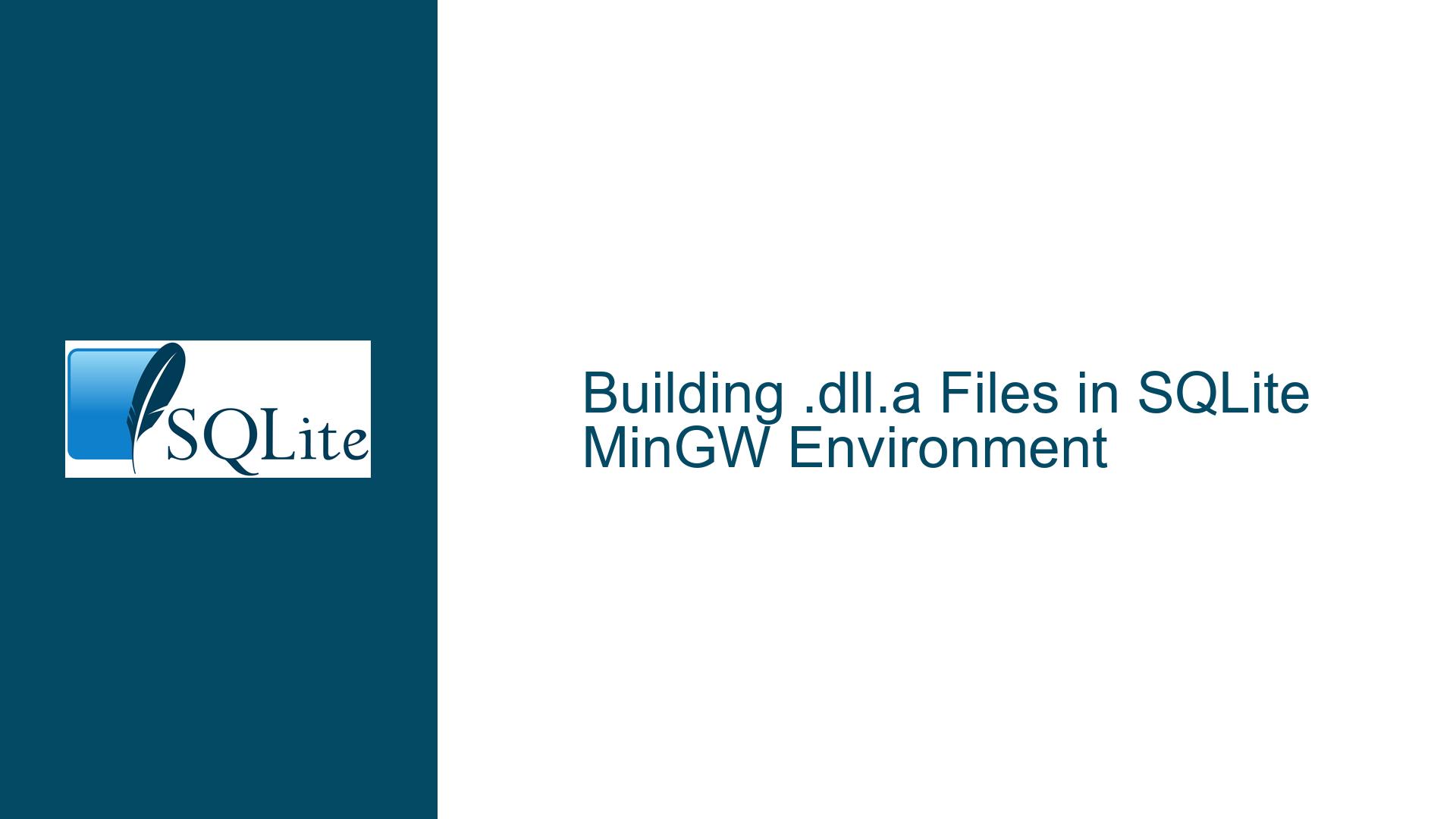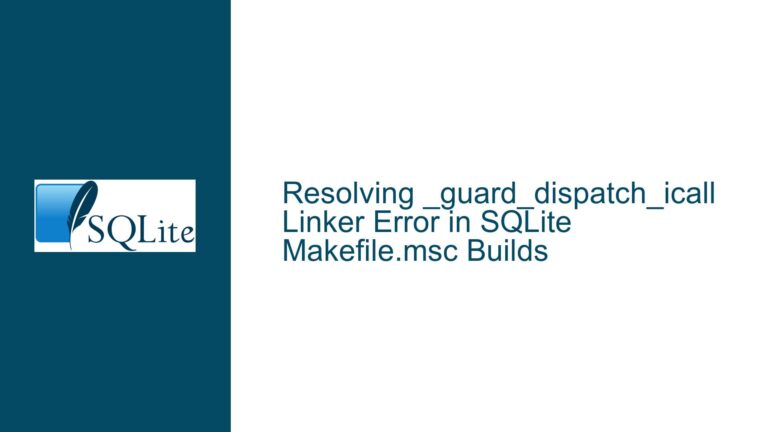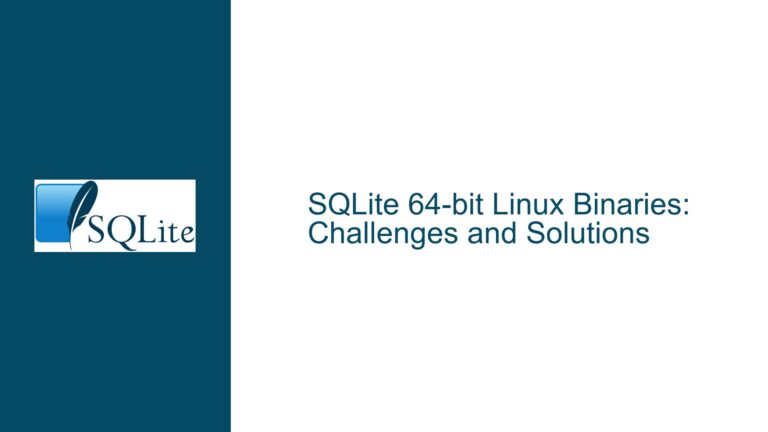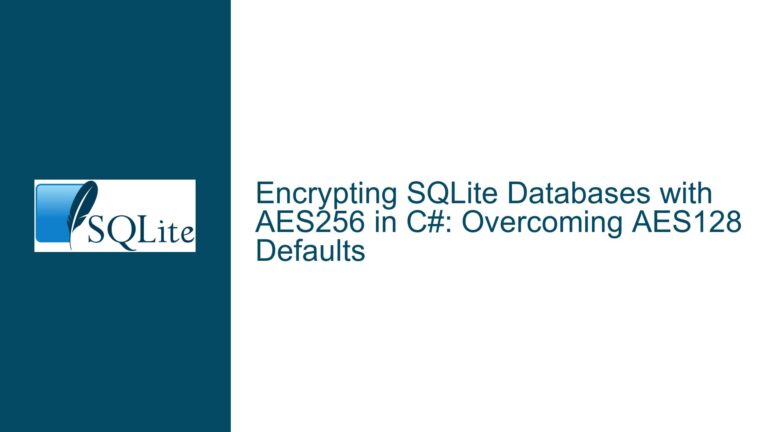Building .dll.a Files in SQLite MinGW Environment
Issue Overview: Missing .dll.a Files in MinGW Build
When building SQLite using the MinGW environment, particularly for the mingw-w64-sqlite package on Arch Linux, the expected output includes three types of files: static libraries (.a), shared libraries (.dll), and import libraries (.dll.a). The issue at hand is that while the build process successfully generates the .a and .dll files, it fails to produce the .dll.a files. These import libraries are crucial for linking against the shared library in a MinGW environment, as they contain the necessary symbols and references required for dynamic linking.
The problem arises specifically when using the autosetup build system for SQLite 3.49.0. The build system is configured to generate .dll files for shared libraries in a MinGW environment, but it does not natively support the creation of .dll.a files. This is because SQLite’s build system is primarily designed for native Windows builds and has limited support for non-native environments like MinGW. The lack of .dll.a files can be a significant roadblock for developers who rely on these files for their development and runtime environments, particularly in distributions like Arch Linux where development and runtime packages are not separated.
Possible Causes: Why .dll.a Files Are Not Generated
The absence of .dll.a files in the MinGW build can be attributed to several factors. First, SQLite’s build system is not inherently configured to generate import libraries for MinGW environments. The build system uses the .dll extension for shared libraries in MinGW, but it does not include the necessary flags or configurations to produce the corresponding .dll.a files. This is a platform-specific requirement that is not universally applicable, and thus, it is not included in the default build configuration.
Second, the build system’s configuration scripts (e.g., configure and Makefile.in) do not automatically detect or apply the necessary linker flags for generating import libraries. In MinGW, the -Wl,--out-implib,libsqlite3.dll.a flag is required to instruct the linker to produce the .dll.a file. However, this flag is not included by default in the build process, leading to the omission of the import library.
Third, the SQLite development team has explicitly stated that they do not officially support non-native Windows builds, including MinGW. This means that the build system is not extensively tested or optimized for these environments. While the build system may work in some MinGW-like environments (e.g., msys2 "ucrt64"), it is not guaranteed to produce the expected output in all cases. This lack of official support can lead to inconsistencies and missing components, such as the .dll.a files.
Finally, the issue may also stem from the specific configuration of the PKGBUILD file used in the Arch Linux package. While the PKGBUILD file may appear correct at first glance, subtle differences in the build environment or the way the build flags are applied can lead to the omission of the .dll.a files. For example, if the SH_LDFLAGS variable in the cc-shared.tcl script is not correctly set to include the -Wl,--out-implib flag, the import library will not be generated.
Troubleshooting Steps, Solutions & Fixes: Generating .dll.a Files in MinGW
To resolve the issue of missing .dll.a files in the MinGW build, several steps can be taken. These steps involve modifying the build configuration, applying specific linker flags, and ensuring that the build environment is correctly set up to support the generation of import libraries.
Step 1: Modify the Build Configuration to Include the Necessary Linker Flags
The first step is to ensure that the build system includes the -Wl,--out-implib,libsqlite3.dll.a flag when building the shared library. This flag instructs the linker to generate the import library (.dll.a) alongside the shared library (.dll). To do this, you need to modify the SH_LDFLAGS variable in the cc-shared.tcl script or the equivalent configuration file used in the build process.
In the cc-shared.tcl script, locate the section that defines the SH_LDFLAGS variable for the MinGW environment. Append the -Wl,--out-implib,libsqlite3.dll.a flag to this variable. This ensures that the flag is passed to the linker during the build process, resulting in the generation of the .dll.a file.
Step 2: Update the PKGBUILD File to Reflect the Changes
Once the build configuration has been modified, the next step is to update the PKGBUILD file to reflect these changes. The PKGBUILD file is used to automate the build process in Arch Linux, and it must include the necessary modifications to ensure that the .dll.a files are generated.
In the PKGBUILD file, locate the section where the build flags are defined. Ensure that the SH_LDFLAGS variable is correctly set to include the -Wl,--out-implib,libsqlite3.dll.a flag. Additionally, verify that the build process is correctly invoking the modified cc-shared.tcl script or equivalent configuration file.
Step 3: Test the Build Process and Verify the Output
After making the necessary modifications to the build configuration and PKGBUILD file, the next step is to test the build process and verify that the .dll.a files are generated. Run the build process using the updated PKGBUILD file and monitor the output for any errors or warnings.
Once the build process is complete, check the output directory for the presence of the .dll.a files. If the files are present, the issue has been successfully resolved. If the files are still missing, review the build logs for any errors or warnings that may indicate why the .dll.a files were not generated.
Step 4: Propose a Hook for Platform-Specific Build Requirements
To ensure that the build system can accommodate platform-specific requirements like the generation of .dll.a files, it is recommended to propose a hook or mechanism that can be used to pass additional flags or configurations during the build process. This hook can be implemented as a makefile variable or a configure script option that is normally undefined but can be specifically passed in for this purpose.
For example, you can propose adding a MINGW_IMPLIB_FLAG variable to the Makefile.in file. This variable can be set to -Wl,--out-implib,libsqlite3.dll.a when building in a MinGW environment. The build system can then check for the presence of this variable and apply the necessary flags if it is defined.
Step 5: Submit a Diff of the Modified Makefile.in for Review
Once you have successfully implemented the necessary changes and verified that the .dll.a files are generated, the final step is to submit a diff of the modified Makefile.in file for review. This diff should include the changes made to the SH_LDFLAGS variable and any additional hooks or mechanisms that were added to support the generation of .dll.a files.
The SQLite development team can then review the diff and consider incorporating the changes into the official build system. This will ensure that future releases of SQLite include support for generating .dll.a files in MinGW environments, making it easier for developers to build and distribute SQLite packages for these platforms.
Conclusion
The issue of missing .dll.a files in the MinGW build of SQLite can be resolved by modifying the build configuration to include the necessary linker flags, updating the PKGBUILD file to reflect these changes, and proposing a hook for platform-specific build requirements. By following these steps, developers can ensure that the .dll.a files are generated alongside the .a and .dll files, enabling seamless integration of SQLite into MinGW-based development and runtime environments.






